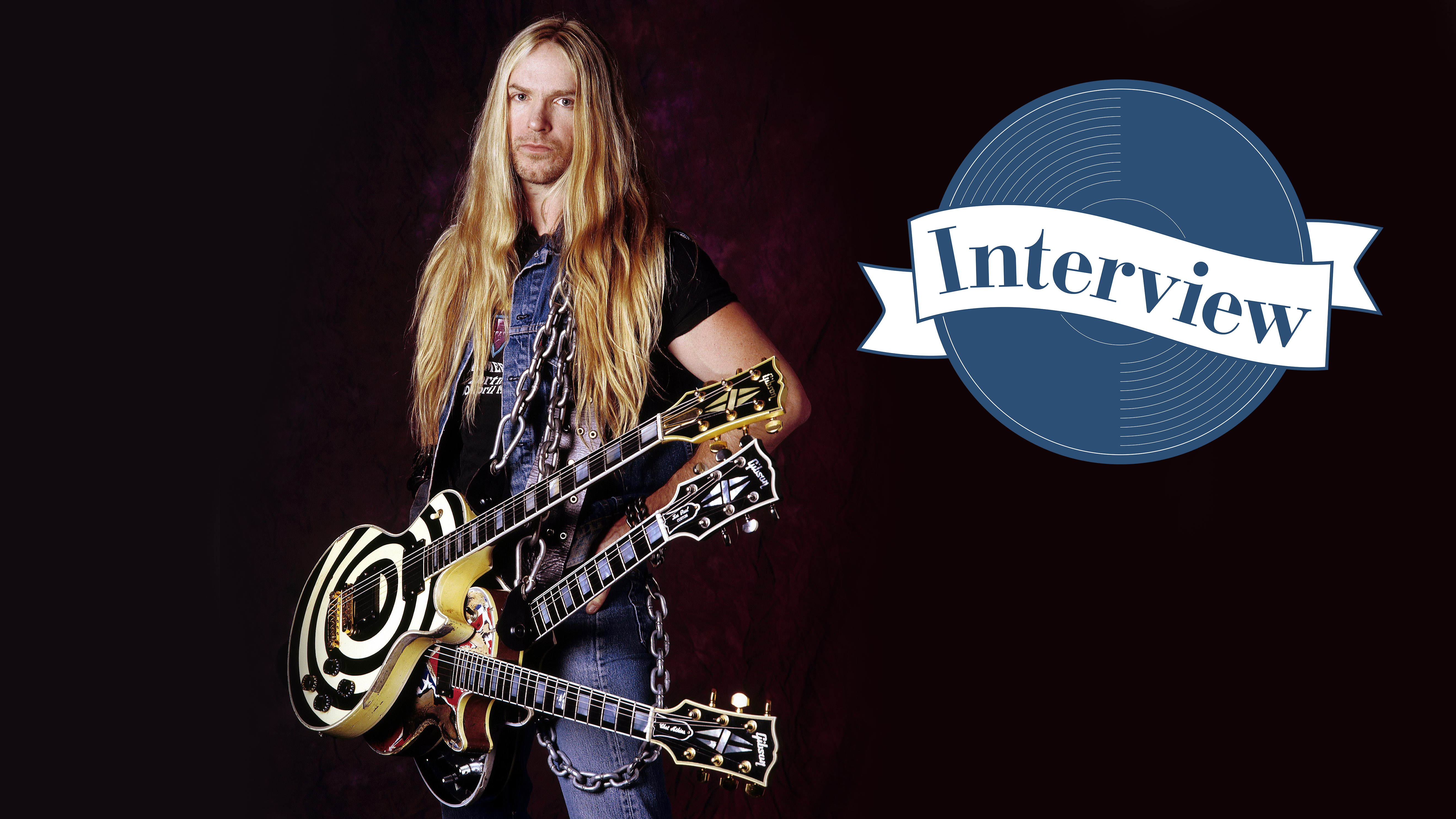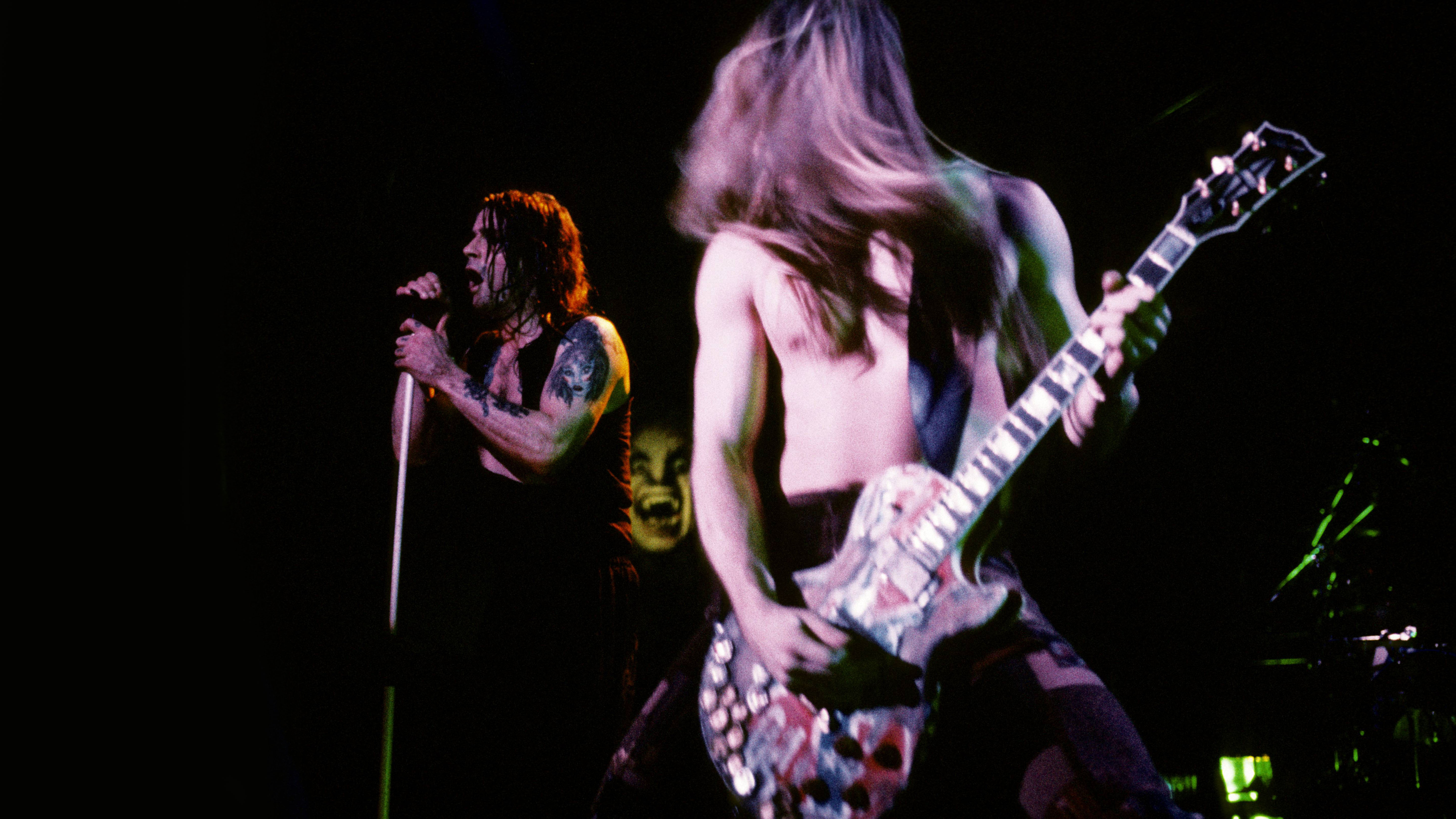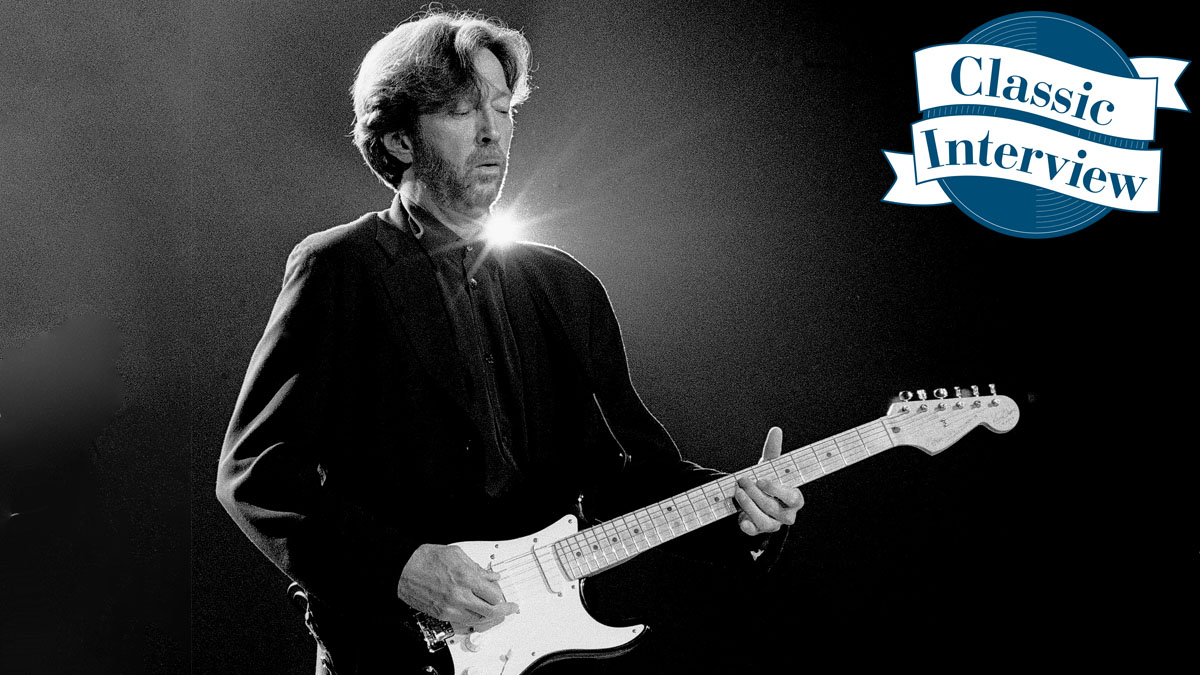Zakk Wylde on stepping up for Ozzy Osbourne's No More Tears: "It was like taking all the crayons out of the box, leaving myself just four to play with and seeing what I could draw with that"
Interview: "If you don’t wanna sound like Eddie, don’t do any taps, harmonics, divebombs or whammy bar stuff.”

Want all the hottest music and gear news, reviews, deals, features and more, direct to your inbox? Sign up here.
You are now subscribed
Your newsletter sign-up was successful
Zakk Wylde was just 19 years old when he joined the Ozzy Osbourne band. His audition tape had been passed over by rock photographer Mark Weiss as a potential replacement for Jake E. Lee and after an initial jam through Bark At The Moon and Suicide Solution with bassist Phil Soussan and drummer Randy Castillo, he was called back again and hired on the spot by The Double O himself.
The long-haired and then-clean-shaven gunslinger made his recording debut with the band the following year with 1988’s No Rest For The Wicked, playing with the kind of burning intensity you’d expect from a young guitarist trying to make his presence known – starting with the wide stretches for his solo on opening track Miracle Man…
The solos were composed to be part of the song, as opposed to just improv and shredding over the whole thing
“That one began with the three note arpeggio I was playing on the first and second strings,” says Wylde, talking to MusicRadar from Lincoln, Nebraska, a few hours ahead of soundcheck at the Bourbon Theatre with Black Label Society. “It was a very composed solo, like a lot of my Ozzy stuff. That’s what came out of the Randy Rhoads school of soloing, where everything had a beginning, a middle and an end.
"The solos were composed to be part of the song, as opposed to just improv and shredding over the whole thing. It’s the chord progressions that accommodate the solos… and I still do that today. I’ll sit there with my practice amp listening to a homework CD or playlist of backing tracks, coming out with different ideas until I find something I’m happy with.”

While No Rest For The Wicked documented the young shredder fitting into his new musical environment, and impressively so, its follow-up was the sound of the group treading new sonic ground and truly going for gold. Still to this day, 1991’s No More Tears remains a firm fan-favourite – recently reissued as part of a 30th anniversary expanded edition. Though he was keen on paying tribute to the Ozzy guitarists that came before him, Wylde was also hoping to inject his own identity into the mix and stand out from the uber shredders of the late 80s…
“When I was working on that first record, I was only 19 years old, and then we started on No More Tears soon after,” continues Wylde. “I was wondering how I could sound like me and no-one else. I made a grocery list. If you don’t want to sound like Yngwie, who was still at the height of his dominance, don’t do any harmonic minor or classical arpeggios and sweeps. Cross that off the list. If you don’t wanna sound like Eddie, don’t do any taps, harmonics, divebombs or whammy bar stuff.”
I was looking at the list and figured the only thing left would be pentatonic scales
The guitarist had also noticed a tendency for rock and metal players to play more modally and decided that a more direct-sounding pentatonic attack could, as well as helping him stand out, force him to become more inventive. “At the time, three note per-string diatonic scales were super popular and everybody was playing in the vein,” Wylde recalls. “I was looking at the list and figured the only thing left would be pentatonic scales.
Want all the hottest music and gear news, reviews, deals, features and more, direct to your inbox? Sign up here.
"So it was like taking all the crayons out of the box, leaving myself just four to play with and seeing what I could draw with that. It forces you to come up with something, when you are working with less. That’s how I approached it, anyway!”
The opening track on No More Tears, Mr. Tinkertrain, has a monster riff using open power chords while pulling off the minor third on the sixth string…
“That was us summoning the power of Malcolm and Angus Young. To me, it sounds very AC/DC, you know what I mean? As for the intro part, that reminds me of The Who. So that song had those flavourings in the soup. And those influences came from our love of those bands.”
Ozzy he told us to remember it and we’ll use it for something. Later we ended up winning a Grammy with that song!
I Don’t Want To Change The World is another heavy hitter, with a lot of palm-muting and a major pentatonic fill at the end of the first chorus line…
“Yeah, there’s that fill-in lick that comes in. I remember when the man riff came about. We were at Joe’s Garage in Burbank, just rehearsing and writing material for the record. Ozzy hadn’t gotten there yet. I remember jamming that riff as a joke because we’d fill in the pauses, just talking into the mic.
"The whole premise was how we could never get a date, so I’d sing something like, ‘Hi, my name’s Zakk and I don’t have a job and live with my parents!’ before going back into the riff. The joke was you don’t have a home, a car or a job and you probably won’t be getting laid anytime soon. We were doing that riff and cracking up laughing the whole time. Ozzy walked in and said, ‘What’s that riff?’ and I said, ‘Ozzy, we’re just goofing around!’ So he told us to remember it and we’ll use it for something. Later we ended up winning a Grammy with that song (laughs).”
A post shared by Zakk Wylde (@zakkwyldebls)
A photo posted by on
Mama, I’m Coming Home feels like a nod to your country roots, with a lot of major ideas…
“It’s very Allman Brothers, when you listen to it. It’s like taking the A minor pentatonic scale at the fifth fret, where it sounds mean and minor, and moving it to the second fret, and everything sounds bright and happy because of the major notes. That’s a big part of that Allman Brothers sound – and they’d always be shifting from major to minor.
"Mama, I’m Coming Home is all E major and then the solo is in A major [tuned half a step down]. Whether your thirds are minor or major can play a big part in the overall sound.”
The main riff in Desire has some really interesting pushes and pulls – there’s almost a staccato swing to it…
“It was always fun playing that one live. Yeah, I’m trying to remember how it came together – it started off with me and Randy [Castillo] drumming along. Then I started using open A and E position power chords, which kinda reminded me of a Van Halen or Judas Priest kinda thing – putting those chords over a second fret F# position riff.
"When it came to the solo, it was all from Ozzy saying, ‘Construct a solo that takes you another place… a great solo should always do that!’ And, again, that goes back to the Randy Rhoads school of soloing.”
Some of the tracks we just discussed were among Lemmy co-writes. Did you work with him at any point or was that all down later down the line?
“Na, the music was always done before. Ozzy just called Lemmy up after coming up with a vocal line of what he was going to do and we sent Lemmy the track. That way he could put the right words to what Ozzy was singing. But Lemmy never sat with us when we were in the room working on the songs. He would hear the line and fit the syllables to Ozzy’s melody. He wasn’t in the room working on chord changes or the songs, he was just there to write lyrics.”
The part I play is like an ode to Freebird
Mike Inez, who played with you in the Ozzy band before joining Alice In Chains, had some pretty major involvement in penning the title track…
“He pretty much wrote the whole song! Mike instigated that whole thing. We were in rehearsals and he just started playing that bass line and we all knew it was killer. Randy started playing drums just like how you hear it in on the record and then John Sinclair came in with that keyboard line. And I did a slide thing based on my love for the Allman Brothers and Skynyrd.
"The part I play is like an ode to Freebird, it’s not too different to the Freebird intro. Then we stopped for a bit and wondering what to do next. Ozzy suggested doing something like War Pigs and Black Dog, where the vocal line is followed by guitar – that whole call and answer thing. The riff that I play in the verses with the ‘dun-dun-dun’ came from the Lord Iommi swap meet, it was behind a plate and a toaster. I was like, ‘Right, how much for that riff?’ and he said it was eight bucks. I gave him 10 dollars and said, ‘Keep the change!’”
No More Tears also features one of your most signature solos – and you’ve told us in the past it was just done in one take…
“Yeah, what you hear on the record is just one pass! I constructed it to fit the keyboard part and then go into something else. There’s a lot of pentatonic licks in the beginning and then for the big ascend at the end, that’s just me fitting along to the chords going up. So I knew what I was going to be playing and had it ready to nail in one take.”
Hellraiser is an interesting track, with double notes and rhythms that almost skip around. A bit like Desire, some of the riffs are trickier to play than they sound…
“Yeah, it’s almost a bit of a funky kind of thing for Ozz. Last time I heard it on the radio, I felt that one came out good. The production on it and the mix that Michael Wagener did, along with the performances from the guys in the band, made it great.”
As for gear, was it mainly your Gibson Les Paul Customs into Marshall JCM800s via a Boss SD-1?
“Yeah! I was using my Boss SD-1, going into my 100-watt JCM800 2203 head. I think it had EL34s back then, because it was before I started using 6550s or KT88s to get a fatter sound. I also think Michael Wagener put some Yamaha SPX90 Symphonic in there. I didn’t record with that [chorus] sound but I think it end up being a big part of the tone.
"At that point I think I was using Celestion Greenbacks, as it was before I’d started using 75-watters. And guitar-wise it would have been either the Grail or the Rebel, my old Les Paul Customs with the ebony fretboards and maple necks. Actually, on the Rebel, it’s a rosewood neck.”
That made me realise the power of pickups - they’re basically a microphone
You’ve sworn by the EMG 81/85 from pretty much day one. Have you ever tried other EMG sets like the 57/66 or newer pickups like the Fishman Fluence series?
“Na, I never tried the other EMG sets. I haven’t tried any of the Fishman stuff because I’m just an 81/85 guy. I’ve pretty much stuck with the same kind of set up from Miracle Man to right now. Before I had EMGs, my Les Pauls had stock PAFs in there. I had this 1979 Marshall Master Volume combo and one of my students had this Fender Jaguar with EMG pickups. I saw them and asked, ‘What are those?’ and he explained they needed a 9v battery. And he plugged in and hit a G chord and it sounded like someone had taken a blanket off the speakers. I was like, ‘Wow, that’s what this amp is supposed to sound like!’
"I couldn’t believe the high fidelity, from the glassy highs to the mids and bottom end, everything was tight-sounding. It completely smoked my guitar… and my guitar was thicker and more expensive! That made me realise the power of pickups - they’re basically a microphone. You are going to hear the difference between a cheap microphone and an expensive one. That’s why I switched over to EMG. They pick up all the clarity and make everything sound tight, which is important for this kind of music.”
We have to ask – that announcement about Jeff Beck and Eric Clapton guesting on the new Ozzy album came quite out of the blue!
“The new Ozzy stuff is sounding great. And for sure, it’s an honour to play on a record with all my heroes. It’s pretty cool… I can’t wait for everyone to hear it. I’ve always loved Blow By Blow and Wired, but honestly every record Jeff Beck has put out is amazing.”
It’s hard to imagine what he would sound like on an Ozzy track, to be perfectly honest, but like you say – everything Jeff does is incredible…
“It definitely sounds slamming. The same goes for all the guys – what Tony Iommi played, and then Eric Clapton and Jeff Beck, it’s all killer for sure. On those tracks I’m playing rhythm guitar for my heroes… it’s crazy! It sounds awesome and I’m beyond honoured to be doing it.”
Recently I’ve been listening to a lot of Pat Martino, Joe Pass, Ted Greene and Jim Hall – all those jazz guys.
There’s also some new music coming from Black Label Society, with some more harmonies from you and [co-guitarist] Dario Lorina…
“As I was writing this record I knew we’d be using Dario in that vein. So now it’s truly a two-guitar player band and album. We’re going for a mix of Allman Brothers, Thin Lizzy and Judas Priest, and you need two guitarists to play those parts… especially the harmonies.”
Aside from recording, how else have you kept your chops up over lockdown – are there any new exercises or scales you’ve been working on?
“I love my scales. I enjoy the running of the scales and warming up on different techniques. Recently I’ve been listening to a lot of Pat Martino, Joe Pass, Ted Greene and Jim Hall – all those jazz guys. I listen to players like that and try to emulate the licks, but maybe from a more pentatonic framework.
"Obviously when you play a solo, it’s always got to fit the song. You can’t just fit in licks because you learned them. It has to have context. I could never put anything jazzy in Mama, I’m Coming Home, that flavour wouldn’t have fit the soup!”
Even if Angus Young knew how to play melodic minor and stuff like that, it wouldn’t matter, because if it didn't fit Hells Bells or Back In Black, he'd put it to the side
Pat Martino is devastatingly fast – and that’s before you even get into the philosophy and theory behind his note choices…
“As fast as Pat Martino is, he’s still musical when he’s playing. It’s the same with Yngwie… sure, he plays fast, but it’s musical and he’s speaking. The same goes for Allan Holdsworth and, again, he could play really outside really fast. But even looking at his scales, no matter how dissonant it would get, he always sounded musical. He’d use the whole tone scale but he wasn’t playing it because it was something he learned, he played it because it fit the music.
"It’s always got to fit the song. Even if Angus Young knew how to play melodic minor and stuff like that, it wouldn’t matter, because if it didn't fit Hells Bells or Back In Black, he'd put it to the side. So that’s why I’ve been listening to those jazz guys and learning their licks from a more bluesy frame of mind.”
The 30th anniversary edition of No More Tears is out now via Sony Music. Black Label Society's Doom Crew Inc will be released on 26 November. The release date for the new Ozzy Osbourne album is still TBC.
Amit has been writing for titles like Total Guitar, MusicRadar and Guitar World for over a decade and counts Richie Kotzen, Guthrie Govan and Jeff Beck among his primary influences. He's interviewed everyone from Ozzy Osbourne and Lemmy to Slash and Jimmy Page, and once even traded solos with a member of Slayer on a track released internationally. As a session guitarist, he's played alongside members of Judas Priest and Uriah Heep in London ensemble Metalworks, as well as handling lead guitars for legends like Glen Matlock (Sex Pistols, The Faces) and Stu Hamm (Steve Vai, Joe Satriani, G3).

